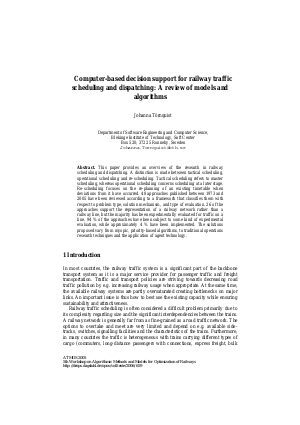Computer-based decision support for railway traffic scheduling and dispatching: A review of models and algorithms
Author Johanna Törnquist
-
Part of:
Volume:
5th Workshop on Algorithmic Methods and Models for Optimization of Railways (ATMOS'05) (ATMOS 2005)
Part of: Series: Open Access Series in Informatics (OASIcs)
Part of: Conference: Symposium on Algorithmic Approaches for Transportation Modelling, Optimization, and Systems (ATMOS) - License:
 Creative Commons Attribution-NonCommercial-NoDerivs 3.0 Unported license
Creative Commons Attribution-NonCommercial-NoDerivs 3.0 Unported license
- Publication Date: 2006-08-09
File

PDF
OASIcs.ATMOS.2005.659.pdf
- Filesize: 412 kB
- 23 pages
Document Identifiers
Subject Classification
Keywords
- Decision support
- railway traffic scheduling
- railway traffic dispatching
- overview
Metrics
- Access Statistics
-
Total Accesses (updated on a weekly basis)
0Document
0Metadata
Abstract
This paper provides an overview of the research in railway scheduling and dispatching. A distinction is made between tactical scheduling, operational scheduling and re-scheduling. Tactical scheduling refers to master scheduling, whereas operational scheduling concerns scheduling at a later stage. Re-scheduling focuses on the re-planning of an existing timetable when deviations from it have occurred. 48 approaches published between 1973 and 2005 have been reviewed according to a framework that classifies them with respect to problem type, solution mechanism, and type of evaluation. 26 of the approaches support the representation of a railway network rather than a railway line, but the majority has been experimentally evaluated for traffic on a line. 94 % of the approaches have been subject to some kind of experimental evaluation, while approximately 4 % have been implemented. The solutions proposed vary from myopic, priority-based algorithms, to traditional operations research techniques and the application of agent technology.This paper provides an overview of the research in railway scheduling and dispatching. A distinction is made between tactical scheduling, operational scheduling and re-scheduling. Tactical scheduling refers to master scheduling, whereas operational scheduling concerns scheduling at a later stage. Re-scheduling focuses on the re-planning of an existing timetable when deviations from it have occurred. 48 approaches published between 1973 and 2005 have been reviewed according to a framework that classifies them with respect to problem type, solution mechanism, and type of evaluation. 26 of the approaches support the representation of a railway network rather than a railway line, but the majority has been experimentally evaluated for traffic on a line. 94 % of the approaches have been subject to some kind of experimental evaluation, while approximately 4 % have been implemented. The solutions proposed vary from myopic, priority-based algorithms, to traditional operations research techniques and the application of agent technology.
Cite As Get BibTex
Johanna Törnquist. Computer-based decision support for railway traffic scheduling and dispatching: A review of models and algorithms. In 5th Workshop on Algorithmic Methods and Models for Optimization of Railways (ATMOS'05). Open Access Series in Informatics (OASIcs), Volume 2, pp. 1-23, Schloss Dagstuhl – Leibniz-Zentrum für Informatik (2006)
https://doi.org/10.4230/OASIcs.ATMOS.2005.659
BibTex
@InProceedings{tornquist:OASIcs.ATMOS.2005.659,
author = {T\"{o}rnquist, Johanna},
title = {{Computer-based decision support for railway traffic scheduling and dispatching: A review of models and algorithms}},
booktitle = {5th Workshop on Algorithmic Methods and Models for Optimization of Railways (ATMOS'05)},
pages = {1--23},
series = {Open Access Series in Informatics (OASIcs)},
ISBN = {978-3-939897-00-2},
ISSN = {2190-6807},
year = {2006},
volume = {2},
editor = {Kroon, Leo G. and M\"{o}hring, Rolf H.},
publisher = {Schloss Dagstuhl -- Leibniz-Zentrum f{\"u}r Informatik},
address = {Dagstuhl, Germany},
URL = {https://drops.dagstuhl.de/entities/document/10.4230/OASIcs.ATMOS.2005.659},
URN = {urn:nbn:de:0030-drops-6592},
doi = {10.4230/OASIcs.ATMOS.2005.659},
annote = {Keywords: Decision support, railway traffic scheduling, railway traffic dispatching, overview}
}
